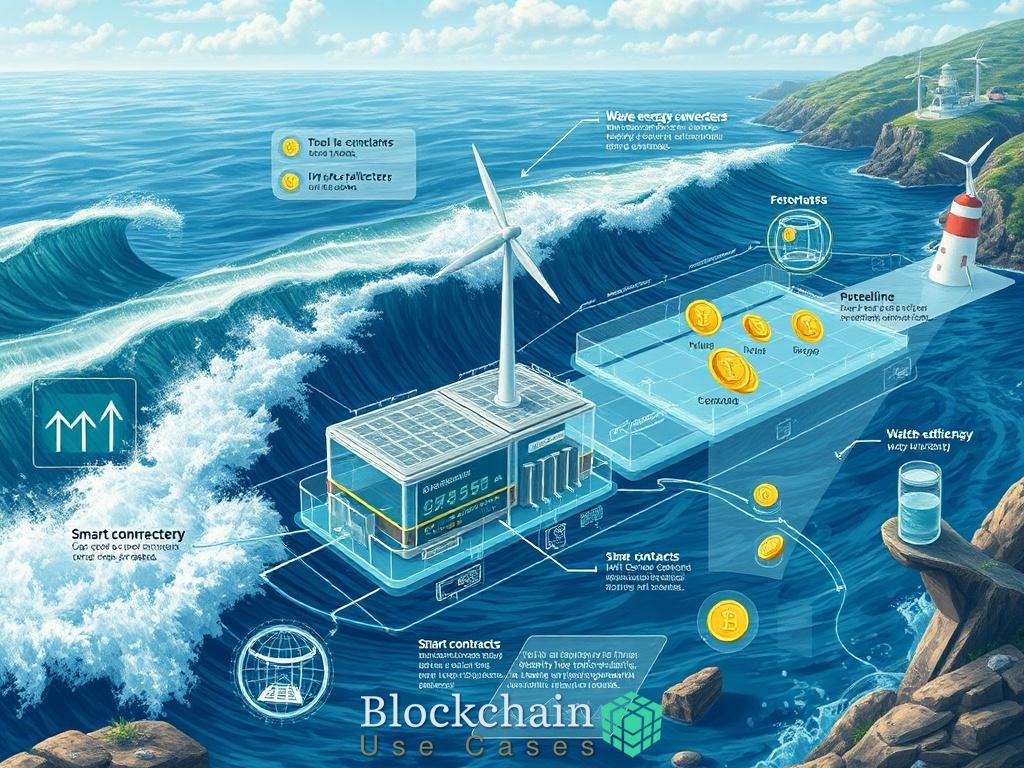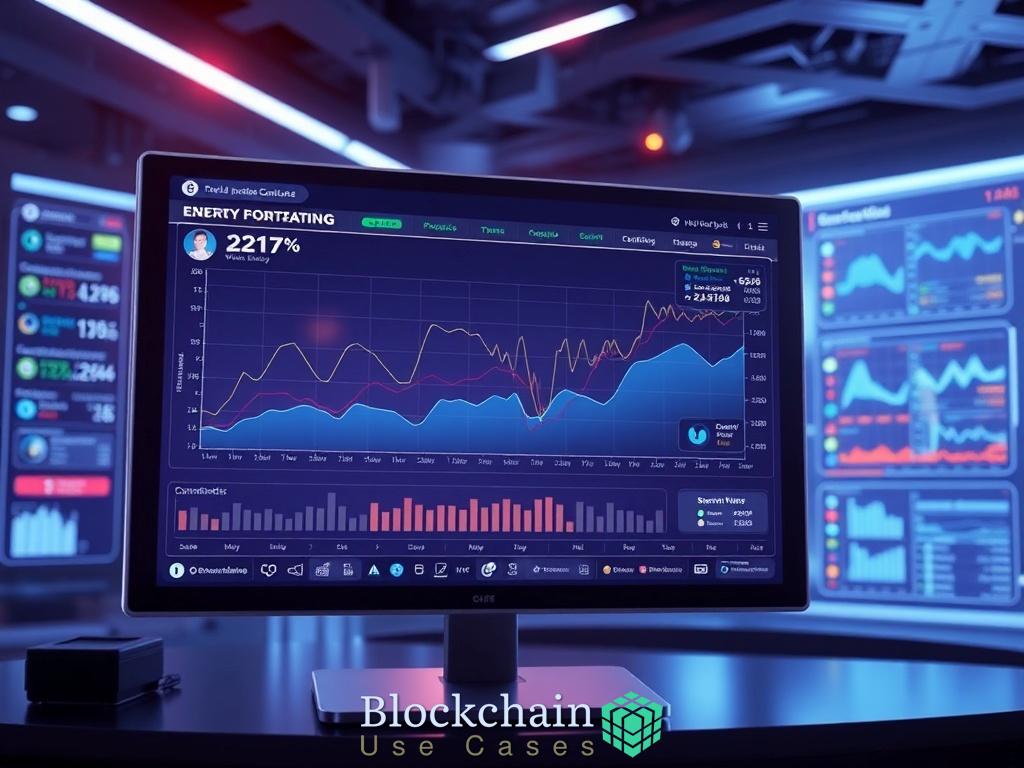Introduction to Smart Contracts in Wave Energy
As the world shifts towards sustainable energy sources, innovative technologies are playing a crucial role in enhancing efficiency and transparency in resource allocation. Among these technologies, smart contracts have emerged as a transformative tool in the wave energy sector. These self-executing contracts, with the terms of agreement directly written into code, have the potential to revolutionize how energy is traded and managed.
Smart contracts operate on blockchain technology, offering a decentralized platform where agreements can be executed without the need for intermediaries. This not only reduces transaction costs but also minimizes the risk of fraud. In the context of wave energy, smart contracts can facilitate real-time trading of energy credits, ensuring that producers and consumers engage in a secure and efficient marketplace.
Implementing smart contracts in wave energy trading provides numerous advantages. The following list outlines the key benefits:
- Transparency: All transactions are recorded on a public ledger, allowing for easy verification and auditing.
- Efficiency: Smart contracts automate processes, reducing the time and effort required for energy trading.
- Cost Reduction: By eliminating intermediaries, both producers and consumers can save on transaction fees.
- Security: The use of cryptographic algorithms ensures that the agreements are tamper-proof.
- Flexibility: Smart contracts can be programmed to adapt to changing market conditions, offering dynamic pricing models.
As we delve deeper into the capabilities of smart contracts, it is evident that they not only streamline operations but also enhance the overall integrity of wave energy markets. The future of energy trading will likely hinge on the successful integration of these advanced technologies.
Mechanisms of Resource Allocation in Wave Energy Systems

In the rapidly evolving landscape of wave energy, the integration of smart contracts is enabling more sophisticated mechanisms for resource allocation. These automated agreements not only streamline operations but also ensure that energy is distributed in a manner that reflects real-time supply and demand. This responsiveness is crucial, as wave energy production can vary significantly based on environmental conditions, necessitating a system that can adapt promptly.
Decentralized Resource Management is at the heart of smart contracts in wave energy systems. By leveraging blockchain technology, these contracts facilitate a decentralized management framework where stakeholders can interact directly without the need for intermediaries. This not only enhances transparency but also fosters a competitive environment that can drive innovation in resource allocation. The real-time data collected from wave energy converters can trigger automatic adjustments in energy distribution, ensuring that resources are allocated efficiently and equitably among producers and consumers.
Moreover, the dynamic pricing models enabled by smart contracts play a pivotal role in optimizing resource allocation. As market conditions fluctuate, these contracts can automatically adjust pricing based on current supply levels and consumer demand. This adaptability ensures that energy prices reflect the true market value, providing an incentive for consumers to utilize energy during low-demand periods and for producers to maximize output when demand peaks. The result is a more balanced and sustainable energy ecosystem that benefits all participants.
| Aspect | Traditional Allocation | Smart Contract Allocation |
|---|---|---|
| Transparency | Limited access to transaction records | Public ledger for all transactions |
| Efficiency | Manual processes prone to delays | Automated execution of agreements |
| Cost | Higher fees due to intermediaries | Reduced transaction costs |
| Security | Vulnerable to fraud | Tamper-proof agreements |
In conclusion, the application of smart contracts in wave energy resource allocation represents a significant advancement towards a more efficient and transparent energy market. By harnessing the power of automation and real-time data, these mechanisms are poised to reshape how energy is traded, paving the way for a more sustainable future.
Trading Frameworks Utilizing Smart Contracts

As the wave energy sector continues to evolve, the integration of smart contracts is paving the way for sophisticated trading frameworks that promise to enhance market efficiency and stakeholder engagement. These frameworks utilize the principles of blockchain technology to create a more robust and transparent trading environment, facilitating seamless transactions between energy producers and consumers. By embedding the terms of trading into self-executing contracts, stakeholders can ensure a reliable and efficient trading process that is less susceptible to manipulation or error.
Dynamic Trading Models are at the forefront of these innovative frameworks. With smart contracts, trading can adapt in real-time to fluctuations in supply and demand, ensuring that energy prices remain competitive and reflective of current market conditions. For example, when wave energy production surges due to favorable weather, smart contracts can automatically adjust pricing to encourage consumption, preventing energy waste. This dynamic responsiveness not only ensures a more balanced energy marketplace but also incentivizes producers to optimize their output, thus enhancing overall system efficiency.
The integration of IoT devices further amplifies the capabilities of smart contracts in trading frameworks. By utilizing Internet of Things (IoT) technology, real-time data regarding energy generation and consumption can be captured and analyzed. This data feeds directly into smart contracts, enabling them to execute trades based on current market dynamics and consumer behavior. Consequently, energy producers can remain agile, adjusting their production levels in accordance with real-time demand signals, thus fostering a more sustainable trading environment.
Interoperability is another critical aspect of trading frameworks that leverage smart contracts. The ability for different blockchain networks to communicate and share data allows for a more interconnected energy market. This interoperability ensures that energy credits can be traded across various platforms and regions, enhancing liquidity and expanding market reach for producers. As these frameworks continue to mature, they will likely draw on the strengths of multiple blockchain systems, creating a unified marketplace that benefits all participants.
Benefits and Challenges of Smart Contracts in Wave Energy
The rise of smart contracts in the wave energy domain is reshaping the landscape of resource allocation and trading. As these digital agreements gain traction, understanding their benefits and challenges becomes essential for stakeholders aiming to maximize their potential. This exploration not only highlights how smart contracts can enhance efficiency and transparency but also sheds light on the hurdles that must be addressed to fully realize their capabilities.
One of the most significant advantages of smart contracts in wave energy is their ability to streamline operations. By automating transactions and eliminating the need for intermediaries, these contracts reduce the time and resources typically associated with energy trading. This increased efficiency can lead to faster response times to market fluctuations, allowing producers and consumers to adjust more readily to changing energy demands. Furthermore, the transparency offered by blockchain technology ensures that all transactions are publicly recorded, fostering trust among participants and paving the way for a more collaborative energy market.
Despite the numerous benefits, the adoption of smart contracts in wave energy is not without its challenges. One notable concern pertains to the complexity of integration. For existing stakeholders, transitioning to this new system requires substantial investment in technology and training. Additionally, the legal frameworks surrounding smart contracts are still developing, raising questions about regulatory compliance and the enforceability of these agreements. Moreover, vulnerabilities in blockchain technology, such as potential security breaches, pose a risk that stakeholders must carefully consider as they embrace these innovative solutions.
In conclusion, while smart contracts present a promising avenue for advancements in wave energy resource allocation and trading, addressing these challenges is crucial for their successful implementation. The balance between maximizing efficiency and navigating inherent risks will ultimately define the future of energy markets. Stakeholders who proactively engage with these issues can position themselves at the forefront of a sustainable energy revolution.
Future Trends in Wave Energy Trading and Smart Contracts
The evolution of wave energy trading is poised to enter an exciting phase, driven by the ever-increasing sophistication of smart contracts. As stakeholders across the energy sector recognize the immense potential of these digital agreements, they are likely to become integral components of future trading frameworks. The convergence of technological advancements, regulatory shifts, and market dynamics will shape how energy is allocated and traded, ensuring that smart contracts not only facilitate transactions but also play a pivotal role in optimizing resource utilization.
Emerging Technologies and Their Impact on Wave Energy Trading will undeniably influence the future of smart contracts. The integration of advanced analytics, artificial intelligence, and machine learning will enhance decision-making processes, allowing stakeholders to glean actionable insights from vast datasets. As predictive models evolve, energy producers can anticipate demand surges and adjust their output accordingly, leading to a more synchronized energy market. Furthermore, the incorporation of blockchain technology with IoT devices will enable real-time monitoring of ocean conditions and energy generation, creating a feedback loop that empowers smart contracts to function with greater efficiency.
Additionally, the rise of decentralized finance (DeFi) within the energy sector will introduce innovative financing models. By leveraging smart contracts to facilitate peer-to-peer energy trading, individuals and communities can take charge of their energy consumption and production. This democratization of energy trading will not only enhance market access for smaller players but also promote localized energy solutions, ultimately contributing to a more resilient and sustainable energy ecosystem.
Regulatory Evolution and Standardization will play a crucial role in shaping the future of smart contracts in wave energy. As governments and regulatory bodies become more familiar with the intricacies of blockchain technology, we can expect a move towards the establishment of clear frameworks and standards governing smart contract implementation. This regulatory clarity will not only bolster investor confidence but also foster an environment conducive to innovation. Stakeholders will be encouraged to explore new business models, knowing that their agreements are protected under a robust legal framework.





